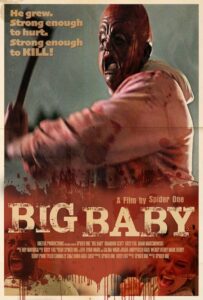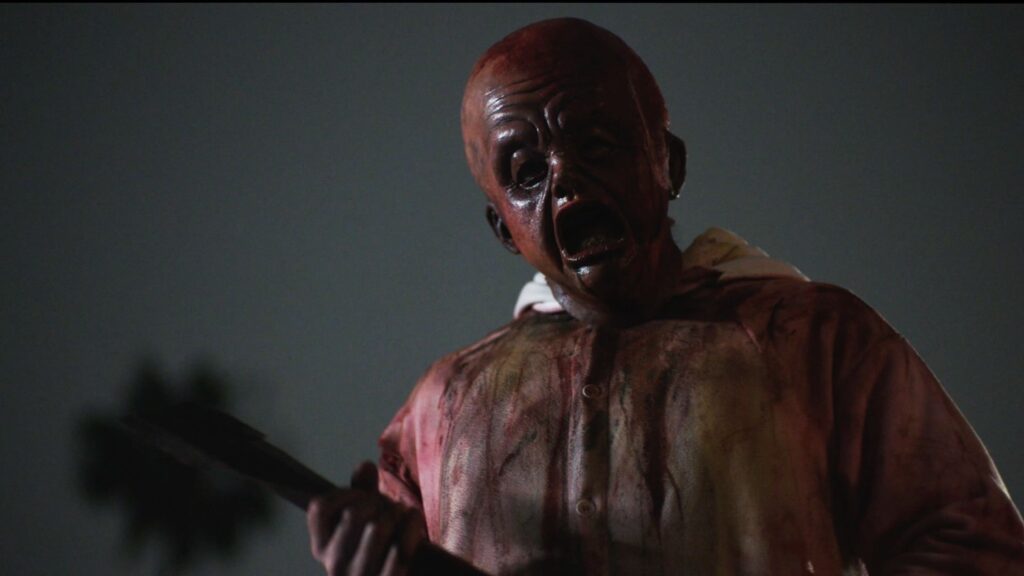
As a writer myself, I am always interested in and drawn to films about the process, as it were: the use of imagination to create ideas and the ability to take those ideas and turn them into a cohesive, engaging, and authentic story. Lots of films have tackled this over the years, with varying levels of success. On the high end, you have something like Adaptation, the Spike Jonze masterpiece from 2002. On the low end, you have something like David Koepp’s 2004 Secret Window, a confused and utterly toothless tale that isn’t nearly as profound as it’s trying to be. Wedged somewhere in between is the new pseudo-slasher film, Big Baby, from filmmaker Spider One, aka the frontman of rock group Powerman 5000, aka Rob Zombie’s little brother. Spider is no stranger to the director’s chair, having helmed 2022’s Allegoria, 2024’s Little Bites, and a slew of videos for his band. Like his older brother, and to his credit, Spider is clearly a horror movie aficionado and has a keen eye when it comes to set pieces and kills. Like his older brother, and to his detriment, his visuals are rarely in service of a story that works without them.
With Big Baby, Spider One is attempting his most high-concept horror idea yet; it’s the story of a horror writer, Adam (Brandon Scott, Descendent), who is reeling over the cold reception to his first film as a filmmaker. We open on him listening to a podcast where two film nerds eviscerate him, though I highly doubt any podcasters in 2025 would get away with encouraging a filmmaker to kill themselves. This isn’t the same time as when Vincent Gallo called for Roger Ebert to get cancer. But I digress. When Adam starts a new project, about a vicious killer in a baby-face mask, his life starts to unravel, as he sees murders happen (or did they?) and cannot tell the difference between dreams and reality. His befuddled girlfriend, Kate (Krsy Fox, Allegoria), does the best she can with it all, but slowly starts to lose both her patience and her trust in her partner. As the bodies pile up, and as Adam loses his grip on reality, the central question becomes: what is actually going on here, and where is it all headed? I don’t know that Big Baby has an answer to either of those questions, but the journey was worth the lackluster destination.
Performances can make or break a film, particularly a horror film, and particularly an indie horror film, not to mention an indie horror film from a Zombie. Luckily, Spider has Brandon Scott in the lead role; he’s an actor with whom I was entirely unfamiliar, but a performer of so much skill and natural ease that you get sucked right into Adam’s story. His chemistry with Krsy Fox as his girlfriend is so lived-in and honest, and Fox herself does some heavy lifting here, too, in what is, essentially, a two-hander about work/life balance. There are extended scenes of Adam and Kate just sitting around talking, and they are always riveting. While Spider might need some help in the story-building department, his way with naturalistic dialogue is pretty spotless. He doesn’t use pop-culture references as an easy way out, either; he creates competent, interesting, and fleshed-out characters here. You’d also be foolish to heap anything but praise on the gore, with some killer (pun intended) practical effects, a shockingly effective mask design, and just the right amount of overkill in some of the gnarlier scenes. It makes sense that David Howard Thornton (“Art the Clown” from the Terrifier films) shows up in a cameo as a gas-station attendant, almost as if Thornton is anointing and validating a new voice in extreme horror. Thornton isn’t its creator, but he’s damned sure the current mascot.
Where the film fails is its nothingburger of an ending, where Spider is clearly going for higher concept horror than he can muster creatively. The answers are kept minimal and, frankly, unsatisfying, and I left the film feeling that the cast and the craftspeople deserved better. Big Baby could have been more than the sum of its parts, but a lot of those parts are just far too hacked-to-death to add up to much. It’s strange to see a filmmaker with such confidence in so many areas sort of lose his courage in the third act. It happens time and time again, and you’d think horror filmmakers, particularly, would have learned that the third act makes or breaks a movie. If anyone tells you otherwise, they don’t know what they’re talking about. Big Baby’s ending left me with the same level of disgruntled malaise as Spider’s brother’s film, Lords of Salem, whose first two thirds are among by favorite horror films of the past couple decades, but whose third act is so unbalanced and flimsy that it made me never want to watch it again. Gymnasts don’t win medals if they don’t stick the landing. Neither should filmmakers.
Gripes aside, those first two thirds slap. The strength of the performances, the skill behind the murder and mayhem, and the restraint in some of the aesthetic choices went a long way for me, and I definitely think it’s Spider’s strongest directorial output thus far. And, while he certainly shares a lot in common with his brother in terms of his artistic leanings and choices, Spider’s films have a more authentic feel to them that I don’t think Rob really cares about. The characters might be in heightened situations, but they act believably. As an attempt to create high-concept horror that attacks viscerally, the film doesn’t really succeed. But Big Baby, as an attempt to bring something new and fresh to the slasher genre, does just enough to make a mark. Mileage will vary with this one, but that’s likely written on the Zombie family crest.
[Screamfest, where Big Baby just screened, runs until October 16.]

